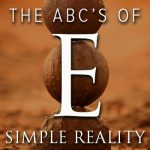 The life of the law has not been logic; it has been experience.
The life of the law has not been logic; it has been experience.
— Supreme Court Justice Oliver Wendell Holmes
.
Experience is not the best way to understanding, knowledge or meaning, it is the only way. In Chinese, t’ i-jen means ‘inner experience.’ We would say this connotation of inner experience means present moment awareness or “feeling.” “It [t’ i-jen] points to a kind of ‘confirmation’ in which the truthfulness of an idea cannot be demonstrated by logical argument but must be lived by concrete experience.”[i]
Seth helps us connect the phenomenon of our experience with what it means in P-A. “Experience is the product of the mind, the spirit, conscious thoughts and feelings, and unconscious thoughts and feelings [emotions]. You are hardly at the mercy of a reality, therefore, that exists apart from yourself, or is thrust upon you. You are so intimately connected with the physical events composing your life experience that often you cannot distinguish between the seemingly material occurrences and the thoughts, expectations and desires that gave them birth.”[ii]
And yet that is exactly what we must do. We must distinguish between the world of form, both physical and mental, and Simple Reality. Through our disciplines of meditation and The Point of Power Practice we become the observer of our P-B experience (illusion) and transcend conventional experience into P-A. Then we have the profound experience of being able to distinguish between the story of P-B which involves continuous suffering and the narrative of P-A, the timeless experience of freedom, joy, compassion and peace.
[i] Murck, Christian [ed.]. Artists and Traditions: Uses of the Past in Chinese Culture. Princeton, New Jersey: Princeton University Press, 1976, p. 10.
[ii] Roberts, Jane. The Nature of Personal Reality. New York: Bantam, 1974, pp. xviii-xix.


